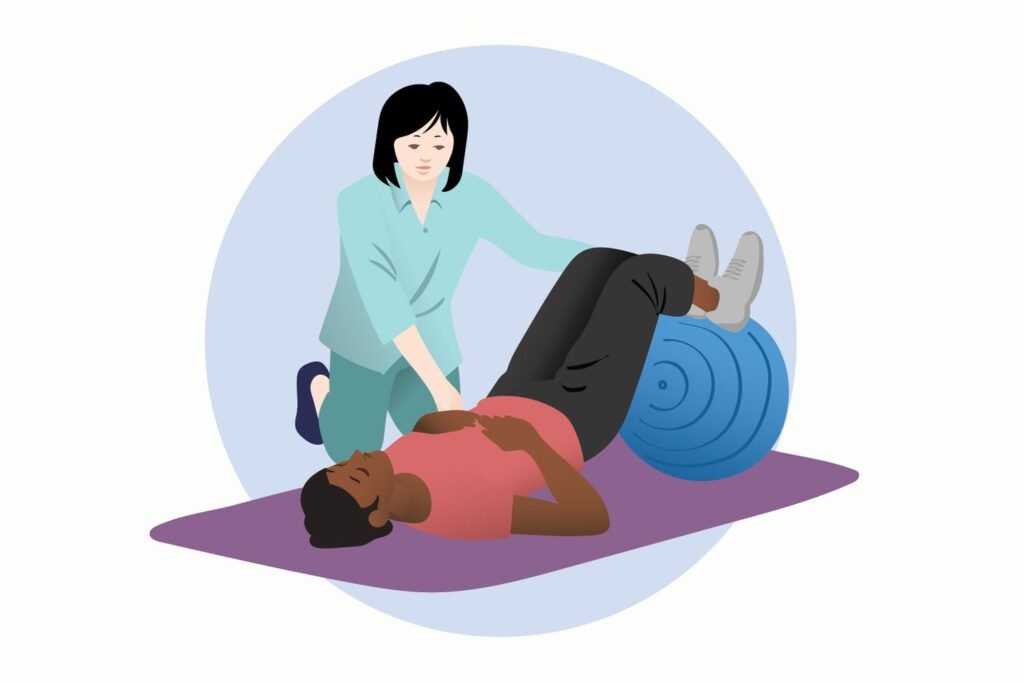Table of Contents
Pelvic Floor Physiotherapy Lahore: Your Comprehensive Guide to Recovery and Wellness
Pelvic health is often overlooked, yet it plays a big role in everyday life. From controlling your bladder to feeling confident during intimacy, pelvic muscles impact many functions. For men and women in Lahore, pelvic floor issues can cause discomfort, embarrassment, and stress. Luckily, specialized physiotherapy clinics in Lahore now offer effective treatments. These therapies can restore strength, reduce pain, and help you feel better overall.

What is pelvic floor physiotherapy Lahore?
Definition and Overview
Pelvic floor physiotherapy is a specialized branch of physical therapy focused on the muscles, ligaments, and tissues that support the pelvic organs — including the bladder, uterus or prostate, and rectum. These muscles play a crucial role in bladder and bowel control, sexual function, and core stability.
When the pelvic floor muscles become weak, tight, or uncoordinated, it can lead to issues like urinary incontinence, pelvic pain, constipation, or discomfort during intercourse. Pelvic floor physiotherapy aims to assess and treat these problems through targeted exercises, manual therapy, education, and lifestyle advice.
Both men and women can benefit from this type of therapy. It is commonly recommended for women after childbirth, people recovering from pelvic surgeries, or anyone experiencing pelvic dysfunction.
A certified pelvic floor physiotherapy lahore
works closely with patients to create a personalized treatment plan. The goal is to restore proper function, reduce pain, and improve overall quality of life.
Who Can Benefit from Pelvic Floor Physiotherapy?
Pelvic floor physiotherapy is not just for women or new mothers — it’s a valuable treatment for people of all ages and genders who are experiencing pelvic floor physiotherapy lahore dysfunction. Here’s a closer look at who can benefit:
1. Women After Childbirth
Pregnancy and delivery can weaken or strain the pelvic floor muscles, leading to issues like urinary incontinence, pelvic organ prolapse, or pain during intercourse. Physiotherapy helps restore strength and function postpartum.
2. Individuals with Urinary or Bowel Problems
People struggling with incontinence, frequent urination, constipation, or incomplete emptying of the bladder or bowels can benefit from techniques that improve pelvic muscle coordination.
3. People with Pelvic Pain
Chronic pelvic pain, painful intercourse, or discomfort in the lower abdomen or genital area can result from tight or overactive pelvic floor muscles. A physiotherapist can help release tension and improve mobility.
4. Men Recovering from Prostate Surgery
Men who have undergone prostate surgery may experience leakage or weakness in the pelvic floor. Physiotherapy can support recovery and improve bladder control.
5. Athletes and Active Individuals
Athletes may unknowingly strain their pelvic floor through intense training. Physiotherapy can help with injury prevention, core stabilization, and performance enhancement.
6. Older Adults
Aging can naturally weaken pelvic muscles. Therapy can help seniors maintain control, confidence, and independence by addressing issues like incontinence or prolapse.

The Importance of Specialized Care
Specialized physiotherapy offers better results than general treatment. It is backed by research showing improved bladder control, reduced pain, and stronger pelvic muscles. Custom plans are tailored to each person’s needs, providing a faster and more effective recovery.
Common Conditions Treated with Pelvic Floor Physiotherapy Lahore
Urinary Incontinence
Many individuals in Lahore struggle with uncontrolled urine flow. This condition has types:
- Stress incontinence — leakage during cough or sneeze
- Urge incontinence — sudden urge and loss of urine
- Mixed incontinence — combination of both
This can cause frustration and embarrassment, affecting work and social life.
Pelvic Pain:
Pelvic pain refers to discomfort or aching felt in the lower abdomen, below the belly button. It can range from a dull, constant ache to sharp, sudden cramps, and it may be caused by a variety of conditions affecting the bladder, bowel, reproductive organs, or the pelvic floor physiotherapy lahore.
Common Causes of Pelvic Pain:
- Pelvic floor muscle dysfunction—tight, weak, or uncoordinated muscles can cause chronic pain.
- Endometriosis or PCOS (in women)—hormonal or inflammatory conditions that affect the uterus or ovaries.
- Prostatitis (in men)—inflammation of the prostate gland.
- Bladder or bowel disorders—such as interstitial cystitis or irritable bowel syndrome (IBS).
- Post-surgical pain or injury—scar tissue and nerve irritation following pelvic surgeries.
How Pelvic Floor Physiotherapy Can Help
Pelvic floor physiotherapy is an effective, non-invasive approach to managing pelvic pain. A trained physiotherapist will assess your posture, muscle tone, and movement patterns to identify the root cause of your discomfort. Treatment may include:
- Manual therapy to release tight muscles or trigger points
- Gentle stretching and strengthening exercises
- Breathing and relaxation techniques
- Education on bladder/bowel habits and posture
Pelvic pain can be frustrating and isolating, but you don’t have to live with it. With professional care, many patients find lasting relief and improved quality of life.
The Pelvic Floor Physiotherapy Process in Lahore
A physical exam helps identify muscle issues. Sometimes, questionnaires or diagnostic tools are used to better understand your condition.
Customized Treatment Plans
Every plan is tailored for you. It may include:
- Pelvic floor exercises like Kegels or resistance training
- Manual therapy to release tense muscles
- Electrical stimulation or ultrasound for healing or muscle activation
Patient Education and Lifestyle Modifications
Effective pelvic floor physiotherapy goes beyond exercises — it also includes educating patients and guiding them toward healthy lifestyle habits that support long-term recovery and pelvic health.
1. Understanding Your Body
Education is a key part of treatment. Patients learn how the pelvic floor muscles function, how they relate to core stability, and what may be contributing to their symptoms. When patients understand their bodies better, they’re more likely to stay engaged in their care and make informed choices.
2. Posture and Body Mechanics
Poor posture, especially during sitting, standing, or lifting, can put extra pressure on the pelvic floor. Physiotherapists teach proper body mechanics to reduce strain and promote healing.
3. Bladder and Bowel Habits
Simple adjustments like timed voiding, avoiding “just in case” bathroom trips, and dietary changes can help manage urinary urgency, incontinence, or constipation. Patients also learn the importance of staying hydrated and getting enough fiber.
4. Exercise and Movement
Low-impact physical activity such as walking, swimming, or yoga is encouraged. Patients are taught how to safely engage their core and pelvic floor during exercise and how to avoid activities that may worsen their symptoms.
Tips for Choosing a Provider
Ask about their training, experience, and approach. Feel comfortable and trust your therapist — it’s key to a successful recovery.
Benefits of Pelvic Floor Physiotherapy in Lahore
- Better bladder and bowel control
- Less pelvic pain or discomfort
- Improved sexual health
- Faster postpartum recovery
- Stronger core and better pelvic support
Actionable Tips for Patients Seeking Pelvic Floor Physiotherapy
- Keep track of your symptoms with a diary
- Do exercises regularly as prescribed
- Be open with your physiotherapist about progress or concerns
- Make healthy lifestyle changes like improving diet and posture
- Seek treatment early to prevent long-term issues
